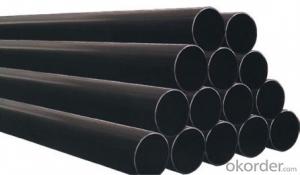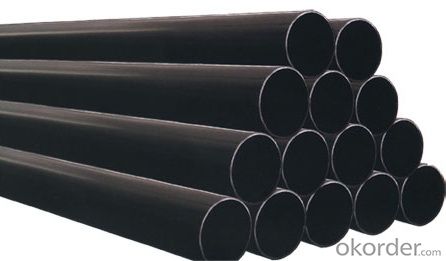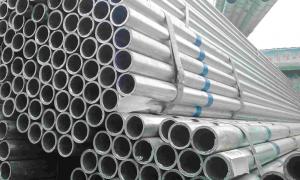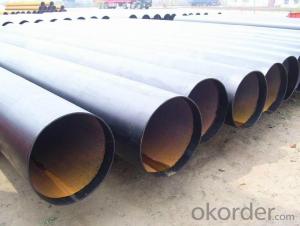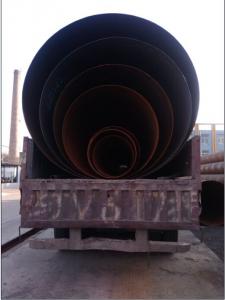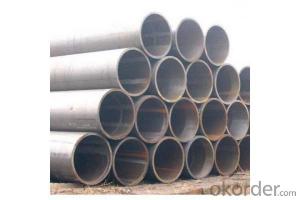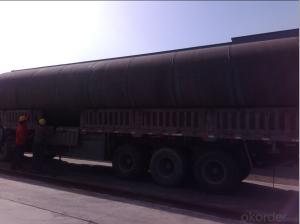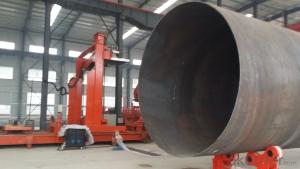26‘' CARBON STEEL SSAW WELDED PIPE API/ASTM/JIS/DIN
- Loading Port:
- Tianjin
- Payment Terms:
- TT OR LC
- Min Order Qty:
- 5 m.t
- Supply Capability:
- 300 m.t/month
OKorder Service Pledge
OKorder Financial Service
You Might Also Like
Packaging & Delivery
Packaging Detail: | standard export packing or as customer's requirement |
Delivery Detail: | within 10 - 30 days |
Specifications
Spiral Welded Steel Pipes and Tubes
1.Material:Q195-Q235
2.Length:1-12m
3.WT:1.0-14mm
4.O.D.:20-273mm
Product Description:
1.Material : Q235,Q345,L245,L290,L360,L415,L450,L485,GrB,X42,46,X52,X56,X60,X65,X70,X80,X100
2,Standard: SY/T5037-2000,GB/T9711-2011,API Spec 5L PSL1/PSL2,ASTM A252\A53,ISO3183,DIN17172,EN10217,JIS G3457,AWWA C200,ASTM A139,ASTM A671,ASTM A672
3.Wall thickness: 3.0mm-30mm
4.Outer diameter: φ168mm-3020mm
5,Length: 5m-12m or as your requirement
6,Corrosion protection standard: DIN30670,DIN30671, AWWAC210, AWWA C203, SY/T0413-2002,SY/T0414-2002
7,Application: Oil, gas, natural gas, water pipe, thermal electricity pipe, steel structure engineering, etc
Q195-q345 Material Steel Pipe's Materials
Elements | Chemical Compsition% | Mechanical Property | ||||||
C% | Mn% | S% | P% | Si% | Yield Point (Mpa) | Tensile Strength(Mpa) | Elongation | |
Q195 | 0.06-0.12 | 0.25-0.50 | <0.050< span=""> | <0.045< span=""> | <0.030< span=""> | >195 | 315-430 | 32-33 |
Q215 | 0.09-0.15 | 0.25-0.55 | <0.05< span=""> | <0.045< span=""> | <0.030< span=""> | >215 | 335-450 | 26-31 |
Q235 | 0.12-0.20 | 0.30-0.70 | <0.045< span=""> | <0.045< span=""> | <0.030< span=""> | >235 | 375-500 | 24-26 |
Q345 | <0.20< span=""> | 1.0-1.6 | <0.040< span=""> | <0.040< span=""> | <0.55< span=""> | >345 | 470-630 | 21-22 |
Packaging & Delivery
Packaging Detail: | Normal exporting packing,in container or bulk vessel or as per clients' request |
Delivery Detail: | 2 months after confimed contract |
Specifications
Large Diameter API 5L X70 PSL2 LSAW Steel Pipe
Grade: X42, X46, X50, X52, X60, B, C
OD: 1.5"-28"
WT: SCH10-SCH160
Brand:TPCO
Large Diameter API 5L X70 PSL2 LSAW Steel Pipe
Specifications:
u Standard: API 5L
u Grade: B, C, X42, X46, X50, X52, X56, X60, X65, X70, X80
u OD: 1.5"-28"
u WT: SCH10-SCH160
u Length: 5-12m
u Ends Finish: plain end, bevel end, grooved end
u Surface Treatment: bare, black varnished, oiled finish, red color, anti-corrosion, 3PE, FBE or epoxy coating
u Technique: hot rolled or cold drawn
u Application: api 5l steel pipe for conveying oil, water, gas
u Invoicing: based on theoretical weight or actual weight
u Payment Terms: L/C at sight, T/T or Western Union
u Trade Terms: FOB, CFR, CIF
u Certification: ABS manufacturing assessment, ABS design assessment, API 5CT, API 5L, DNV manufacturer certificate, ISO9001 quality management system certificate, ISO14001 environment management system certificate, GB/T28001 occupational health and safety management system certificate, A1 class manufacturing license of special equipment certificate, CCS, GL, LR, SGS, TüV, PDE
- Q: How are steel pipes used in water transportation?
- Steel pipes are commonly used in water transportation due to their durability and strength. They can be used for various purposes, such as carrying water from a source to a treatment plant, distributing water to different areas, and even for sewage systems. Steel pipes are highly resistant to corrosion and can withstand high pressure, making them ideal for long-distance water transportation.
- Q: The difference between 12Cr1MoVG alloy steel tube and 15CrMo
- 12Cr1MoVG is a kind of material for alloy tubes. The main purpose is to make the steel structure in the boiler, the use temperature of 580 degrees, requiring high temperature resistance steel plate, durable strength, steel plate in the normalized and tempered state delivery. 12Cr1MoV alloy tube is based on high quality carbon structural steel. It is appropriate to add one or more alloy elements to improve the mechanical properties, toughness and hardenability of steel.
- Q: Can steel pipes be used for steam applications?
- Yes, steel pipes can be used for steam applications. Steel pipes have high strength and durability, making them suitable for carrying high-pressure steam. They can withstand the high temperatures and pressures associated with steam, making them a reliable choice for steam transportation in various industries.
- Q: What type of steel pipe for security windows?
- General anti-theft window through the round tube is 3 cm square tube, 22.5 mm diameter round tube, also can use all square tube to do, if you want to median 304, the pipe is estimated more expensive, the market to do the price in 60 to 110 range. As for plastic steel, Anhui conch brand, the price of 180 this way. Aluminum alloy 110 to 230 specific look what material?!
- Q: What are the factors to consider when selecting pipe materials for high-temperature applications?
- When selecting pipe materials for high-temperature applications, it is important to consider factors such as the maximum operating temperature, corrosion resistance, thermal expansion properties, mechanical strength, and cost. The chosen material should be able to withstand the anticipated temperature without deformation or degradation, resist corrosion from the process fluid or environment, have a low coefficient of thermal expansion to minimize stress on the pipe, possess sufficient mechanical strength to handle the pressure and load, and be cost-effective for the specific application.
- Q: What are the safety precautions for handling steel pipes?
- When handling steel pipes, it is important to take several safety precautions to prevent accidents and minimize the risk of injury. Here are some key safety measures to follow: 1. Personal Protective Equipment (PPE): Always wear appropriate PPE, including safety glasses, hard hats, steel-toed boots, and gloves. This will protect you from potential hazards such as falling objects, sharp edges, or chemical spills. 2. Proper Lifting Techniques: When lifting steel pipes, use proper lifting techniques to avoid strain or back injuries. Bend your knees, keep your back straight, and lift using your legs instead of your back. If the pipe is too heavy, seek assistance or use mechanical lifting equipment. 3. Secure Storage and Stacking: Store steel pipes in a well-organized manner, ensuring they are properly stacked and secured. Use suitable storage methods, such as racks or pallets, to prevent pipes from rolling or falling. Avoid stacking pipes too high to prevent instability. 4. Inspect for Defects: Before handling steel pipes, inspect them for defects such as cracks, corrosion, or dents. Defective pipes can pose serious safety risks, so it is important to identify and remove them from use. 5. Use Appropriate Handling Equipment: When moving or transporting steel pipes, utilize appropriate equipment such as forklifts, cranes, or hoists. Ensure that the equipment is in good working condition, and always follow the manufacturer's guidelines for safe operation. 6. Secure Transportation: If transporting steel pipes by vehicle, make sure they are properly secured to prevent shifting or falling during transit. Use straps, chains, or other restraints to secure the load. 7. Watch for Sharp Edges: Steel pipes can have sharp edges that can cause cuts or injuries. Be cautious when handling them and wear gloves to protect your hands. 8. Communication and Training: Communicate with your team members to ensure everyone understands the proper handling procedures and safety precautions. Provide training on safe lifting techniques, equipment operation, and hazard identification. 9. Maintain a Clean Work Area: Keep the work area clean and free from debris, oil, or other slippery substances that could cause slips or falls. 10. Follow Safety Guidelines: Always adhere to safety guidelines and procedures established by your organization or relevant regulatory authorities. These guidelines may include additional precautions specific to your work environment. By following these safety precautions, you can significantly reduce the risk of accidents and injuries when handling steel pipes. Remember, safety should always be the top priority in any work environment.
- Q: How are steel pipes insulated?
- Steel pipes can be insulated using various methods such as applying insulation materials like foam or fiberglass wraps, using thermal tapes, or employing pre-insulated pipe systems where insulation is integrated into the pipe during manufacturing.
- Q: Can steel pipes be used for irrigation pumps?
- Yes, steel pipes can be used for irrigation pumps. Steel pipes are commonly used in irrigation systems due to their durability, strength, and resistance to corrosion. They can handle the high pressures and flow rates required for efficient irrigation, making them a suitable choice for connecting and transporting water from irrigation pumps.
- Q: What does "buried steel pipe" 6*2SC100 mean?
- Welded steel pipe refers to the use of steel or steel plate bending deformation into a round, square and other shapes after welding into the surface of the joint of the steel pipe. The blank used in welded steel pipe is steel or strip steel.
- Q: Can steel pipes be used for conveying liquids and gases?
- Yes, steel pipes can be used for conveying both liquids and gases. They are commonly used in industries such as oil and gas, water supply, and sewage systems due to their durability, strength, and resistance to corrosion.
Send your message to us
26‘' CARBON STEEL SSAW WELDED PIPE API/ASTM/JIS/DIN
- Loading Port:
- Tianjin
- Payment Terms:
- TT OR LC
- Min Order Qty:
- 5 m.t
- Supply Capability:
- 300 m.t/month
OKorder Service Pledge
OKorder Financial Service
Similar products
Hot products
Hot Searches
Related keywords
